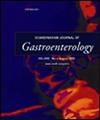类固醇治疗后自身免疫性胰腺炎复发预测因素的新见解。
IF 1.6
4区 医学
Q3 GASTROENTEROLOGY & HEPATOLOGY
引用次数: 0
摘要
目的虽然自身免疫性胰腺炎(AIP)对类固醇治疗反应良好,但 1 型 AIP 的高复发率仍是一个关键问题。本研究分析了 81 例接受类固醇治疗且随访时间≥ 12 个月的 AIP 患者中可能预测复发的九个因素。类固醇治疗后血清 IgG4 下降率的计算方法是将类固醇治疗前和类固醇治疗开始后两个月的血清 IgG4 值之差除以类固醇治疗前的 IgG4 值。结果在中位数 38 个月期间,有 11 名患者(13.5%)复发。多变量分析显示,IgG4相关腹膜后纤维化(HR:5.59;95% CI:1.42-22.0;p = 0.014)和类固醇治疗后血清IgG4下降率低(HR:0.048;95% CI:0.005-0.46;p = 0.008)是AIP复发的重要独立预测因素。根据接受者操作特征曲线数据,区分类固醇治疗前和治疗后两个月血清 IgG4 下降率的临界值为 0.65。结论类固醇治疗开始后血清 IgG4 下降率低以及存在与 IgG4 相关的腹膜后纤维化可预测 1 型 AIP 复发。对于存在这些因素的患者,建议谨慎地逐步减少类固醇剂量并延长维持治疗时间。本文章由计算机程序翻译,如有差异,请以英文原文为准。
New insights into predictors of autoimmune pancreatitis relapse after steroid therapy.
OBJECTIVES
While autoimmune pancreatitis (AIP) responds well to steroid therapy, the high relapse rate in type 1 AIP remains a critical problem. The present study examined predictors of relapse of type 1 AIP following steroid therapy.
MATERIALS AND METHODS
Nine factors potentially predictive of relapse were analyzed in 81 AIP patients receiving steroid therapy with follow-up ≥ 12 months. The rate of serum IgG4 decrease following steroid therapy was calculated by dividing the difference between serum IgG4 values before and at two months after the start of steroid by the IgG4 value before steroid.
RESULTS
A relapse occurred in 11 patients (13.5%) during a median of 38 months. Multivariate analysis revealed that the presence of IgG4-related retroperitoneal fibrosis (HR: 5.59; 95% CI: 1.42-22.0; p = 0.014) and the low rate of serum IgG4 decrease after steroid therapy (HR: 0.048; 95% CI: 0.005-0.46; p = 0.008) were significant, independent predictors of AIP relapse. The cut-off value based on receiver operating characteristic curve data for the rate of serum IgG4 decrease before and at two months after steroid therapy distinguishing patients with and without a relapse was 0.65. Using this cut-off value, the area under the curve, sensitivity, and specificity were found to be 0.63, 0.73, and 0.60, respectively.
CONCLUSION
The low rate of serum IgG4 decrease after the start of steroid therapy and the presence of IgG4-related retroperitoneal fibrosis were predictive of type 1 AIP relapse. Cautious, gradual tapering of steroid dosage and longer maintenance therapy are recommended for patients with these factors.
求助全文
通过发布文献求助,成功后即可免费获取论文全文。
去求助
来源期刊
CiteScore
3.40
自引率
5.30%
发文量
222
审稿时长
3-8 weeks
期刊介绍:
The Scandinavian Journal of Gastroenterology is one of the most important journals for international medical research in gastroenterology and hepatology with international contributors, Editorial Board, and distribution

 求助内容:
求助内容: 应助结果提醒方式:
应助结果提醒方式:


